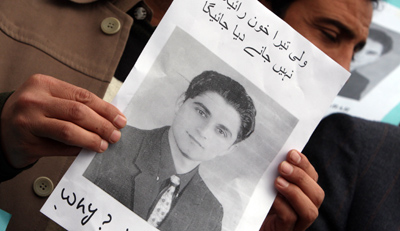Haider Ali, an eyewitness to the 2011 murder of Geo TV reporter Wali Khan Babar, was gunned down on Sunday, two days before he was set to testify in the trial of five suspects. The murder sent shockwaves across Pakistan–one of the deadliest countries in the world for journalists and one of the worst in bringing the killers to justice. According to the prosecutor in the case, Ali had identified several suspects as being involved in Babar’s murder in a recent statement before a judicial magistrate. His killing was the latest in a series of murders that have targeted people linked to the Babar investigation. Five others–including eyewitnesses, police officers, an informant, and a family member of an investigator–have also been murdered.
In response, the Sindh High Court ordered that security be provided to lawyers and witnesses in the case. That security has not actually been deployed, however, according to local media reports. “The point is that the government doesn’t provide protection to witnesses, even in such important cases,” said Azhar Abbas, managing director of Geo TV. “Ali was moved to a different location within Karachi–a dangerous city as is. That simply is not enough. He was provided no security personnel.”
Last month, the Sindh High Court called for the trial to be concluded in 45 days. “The confessional statements [made by the accused] are quite strong and there will be pressure on the court for a conviction,” according a Karachi-based journalist who spoke to CPJ on condition of anonymity. But this most recent murder casts further doubt on whether justice will be served. Other witnesses have already backed down from testifying, the journalists said.
Convictions would send a message that Pakistani authorities are serious about prosecuting the killers of journalists. But there is much reason to believe that authorities will never get to the bottom of this case, never identify or prosecute the architects of Babar’s murder. The murders of witnesses and investigators “proves that there is an organized group or party involved in the murder of Wali Khan Babar. It seems that the government and law enforcement agencies are too scared to come forward and say who is behind these killings,” Abbas told CPJ.
Others argue that even if nominal justice is delivered, it comes too late for any real change. “A conviction will not change anything. Fear has already set in–particularly among young journalists,” the Karachi-based journalist told CPJ.
At least 40 journalists have been killed and dozens injured in Pakistan over the course of the last decade, according to CPJ research. The country is ranked 10th on CPJ’s Impunity Index, which calculates unsolved journalist murders as a percentage of each country’s population. The Pakistani government has shown little willingness to prosecute the killers of journalists.
The five defendants were apprehended by police a few months after Babar’s murder. A sixth suspect was killed in what was widely believed to be an extrajudicial killing by police. Another was arrested this week, but many others remain at large. Altogether more than 20 men were involved in the Babar murder, according to local media reports.
A high-level investigation by a Joint Investigation Team (JIT) alleges that the hit on Babar was issued by Agha Murtaza, a member of the MQM–Pakistan’s third-largest party and considered its most influential secular political organization. The JIT accused Murtaza, who lives in South Africa, of telephoning an MQM operative named Faisal Mota to carry out the murder in Karachi, where the party is in hot competition for political power. Many journalists have questioned why Pakistani authorities have not contacted the South African government or sought to question Murtaza. Mota also remains at large.
The MQM is a well-organized party with a long record of killing political opponents. Many in Pakistan argue that a high profile murder could only have been initiated by someone in the upper echelons.
The MQM has denied accusations of ordering Babar’s murder. Still, prior to his death, Babar had told colleagues that members of the MQM were after him. Zulfiqar Mirza, a member of the Pakistan People’s Party who served as the Sindh Home Minister at the time of the killing, has also accused the MQM of orchestrating Babar’s death.
Babar, 29, an ethnic Pashtun, reported on the clashes between various political parties, extortion, drug dealing and land grabbing in the crime-ridden city of Karachi. In January 2011, at least two assailants intercepted the journalist’s car in Karachi’s Liaquatabad area, shooting him four times in the head and once in the neck.
The suspects in custody have been charged with murder with common intent and under Section 7 of Pakistan’s Anti-Terrorism Act. That means the hearing is taking place in one of Pakistan’s anti-terrorism courts, as it did in the case of murdered Wall Street Journal reporter Daniel Pearl. By law, such proceedings should be wrapped up within seven working days. But such technicalities are usually overlooked in a country where courts are overburdened and judicial proceedings move at a seemingly glacial pace.
The high-profile killing of reporter Daniel Pearl in Pakistan is the only known journalist murder case in which some justice was carried out. A recent report by the Center for Public Integrity, however, reveals that there was only partial justice in the case. Only four of the 27 men allegedly involved in the kidnapping and murder were charged and convicted.
There has not been a single conviction in any of the subsequent killings of Pakistani journalists. Babar’s case presents Pakistani authorities with an opportunity to improve their terrible record of impunity. But do they have any real desire to do so? Their past promises only go so far.
